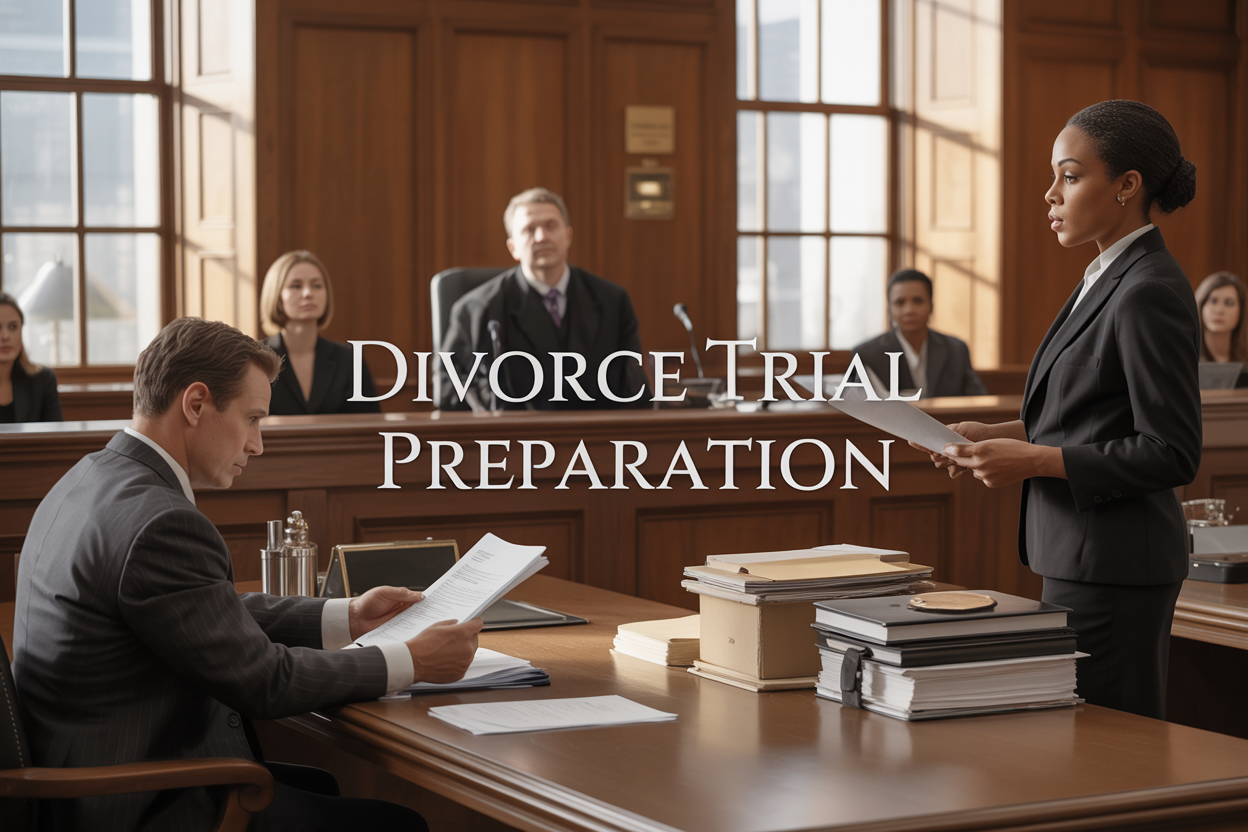
Divorce Trial Preparation: What Really Happens in the Courtroom
Going through a divorce trial can feel overwhelming, especially when you don’t know what to expect once you step into the courtroom. This guide is designed for anyone facing divorce trial preparation – whether you’re just starting the process or your court date is approaching fast.
Many people assume divorce court works like TV dramas, but the reality of divorce courtroom procedures is quite different. Understanding what happens in divorce court ahead of time can help reduce anxiety and improve your chances of a favorable outcome.
We’ll walk you through the essential steps of preparing for a divorce trial, including how to gather the proper documentation and evidence that judges actually care about. You’ll also learn about the divorce trial process itself – from courtroom protocols to managing witness testimony effectively. Finally, we’ll cover how to work with your attorney and navigate those crucial judge interactions that can influence your case’s direction.
The divorce court testimony phase doesn’t have to catch you off guard when you know what’s coming.
Essential Pre-Trial Documentation and Evidence Gathering
Financial Records That Make or Break Your Case
Your financial documentation serves as the backbone of your divorce trial preparation. Tax returns from the past three to five years paint a comprehensive picture of your household’s actual earning capacity, especially when one spouse claims reduced income or operates a business with fluctuating profits. Bank statements reveal spending patterns, hidden transfers, and undisclosed accounts that could significantly impact asset division.
Pay stubs, employment contracts, and bonus agreements demonstrate current earning potential and help establish accurate support calculations. If you or your spouse owns a business, gather profit and loss statements, business tax returns, and corporate bank statements. These documents often reveal personal expenses run through the business or income manipulation tactics.
Credit card statements and loan documents expose debt responsibilities and spending habits that judges consider when dividing liabilities. Investment account statements, retirement fund documentation, and insurance policies with cash value represent assets that require proper valuation and division.
The discovery process allows your attorney to subpoena financial records that your spouse might withhold. Banking institutions, employers, and investment firms must comply with court orders, making it difficult to hide assets or income streams during divorce trial documentation preparation.
Child-Related Documentation for Custody Decisions
Custody battles require meticulous documentation that demonstrates your involvement in your children’s daily lives. School records, including report cards, teacher communications, and attendance records, show which parent actively participates in educational decisions and school activities. Medical records, appointment schedules, and insurance information reveal who is responsible for managing healthcare.
Extracurricular activity schedules, sports team rosters, and arts program documentation prove your engagement in your children’s interests and development. Calendar entries, photos, and receipts from activities create a timeline of parental involvement that courts value when making custody determinations.
Text messages, emails, and communication apps between you and your children provide evidence of your relationship quality and frequency of contact. Similarly, communications with teachers, coaches, and other caregivers demonstrate your active role in coordinating your children’s activities and addressing their needs.
Childcare receipts, babysitter contacts, and after-school program documentation show practical parenting arrangements and financial contributions to childcare expenses. If domestic violence or substance abuse concerns exist, police reports, protective orders, or treatment records become critical evidence for protecting your children’s safety and well-being.
Property Valuation and Asset Discovery Process
Professional appraisals provide accurate valuations for real estate, businesses, and valuable personal property that impact divorce settlements. Real estate appraisals should be current, typically within six months of trial, and conducted by licensed professionals familiar with your local market conditions.
Business valuations require specialized expertise, particularly for professional practices, partnerships, or closely-held corporations. Forensic accountants can uncover hidden business value, personal use of business assets, or income manipulation schemes that affect your marital estate’s true worth.
Personal property inventories document valuable items, such as jewelry, art, collectibles, and vehicles. Photographs, receipts, and insurance appraisals establish ownership and value for items that might otherwise be overlooked or undervalued during negotiations.
Pension and retirement account statements require careful analysis to determine marital versus separate property portions. Some accounts gained value before marriage or through inheritance, while others represent joint matrimonial assets subject to division.
The asset discovery process often reveals hidden accounts, undisclosed debts, or transfers to third parties intended to reduce the marital estate. Forensic accountants and private investigators can trace financial transactions and identify assets your spouse attempts to conceal.
Communication Records and Digital Evidence
Digital communication records provide robust evidence in modern divorce proceedings. Email accounts, text message logs, and social media posts can reveal infidelity, hidden assets, substance abuse, or parenting issues that impact custody and support decisions.
Dating app profiles, social media check-ins, and photos with timestamps create evidence trails that contradict sworn testimony about relationships, spending habits, or lifestyle choices. Screenshots and printed copies preserve this evidence before accounts get deleted or privacy settings change.
Phone records show communication patterns, call frequency, and contact with third parties that might be relevant to adultery claims or child custody evaluations. Cloud storage accounts often contain photos, documents, and communications that parties believe they’ve deleted from their devices.
Video recordings from security systems, doorbell cameras, or smartphones can document domestic violence incidents, parenting interactions, or property damage claims. However, recording laws vary by state, and improperly obtained recordings might be inadmissible in court.
Financial apps and digital payment platforms like Venmo, PayPal, or Cash App reveal spending patterns and money transfers that traditional bank statements might not capture. These records often expose hidden expenses, gambling problems, or financial support for extramarital relationships that affect divorce trial preparation and outcomes.
Understanding Courtroom Procedures and Protocols
Court Etiquette and Professional Behavior Standards
Walking into a divorce courtroom can feel overwhelming, but understanding proper etiquette helps you present yourself professionally. Dress conservatively in business attire – think dark suits, modest dresses, or dress pants with professional shirts. Avoid flashy jewelry, strong perfumes, or casual clothing that might distract from your testimony.
Stand when the judge enters and exits the courtroom, and address the judge as “Your Honor” throughout the proceedings. Never interrupt anyone speaking, including your spouse’s attorney, even if you disagree with what’s being said. Your lawyer will handle objections and cross-examinations.
Keep your emotions in check, regardless of what you hear. Judges appreciate calm, composed behavior and may view emotional outbursts unfavorably. If you need a moment to collect yourself, ask your attorney for a brief recess.
Turn off all electronic devices before entering the courtroom. Some courts allow silent phones, but it’s safer to power them down completely. Taking notes is generally acceptable, but ask your attorney beforehand about the court’s specific policies.
When testifying, speak clearly and directly to the judge unless instructed otherwise. Answer only the question asked – don’t volunteer additional information that wasn’t requested. If you don’t understand a question, ask for clarification rather than guessing at an answer.
Timeline Expectations for Divorce Trial Proceedings
Divorce trial proceedings follow a structured timeline that varies significantly based on case complexity and court schedules. Simple uncontested cases might conclude in a single day, while complex divorces involving substantial assets or custody disputes can stretch across multiple sessions over several months.
The actual trial day typically begins with jury selection if applicable, though most divorce cases are heard by a judge alone. Opening statements usually last 30 minutes to an hour per side, allowing each attorney to outline their client’s position and preview the evidence they’ll present.
Witness testimony forms the bulk of trial time. Each witness undergoes direct examination by the calling attorney, followed by cross-examination from opposing counsel. Key witnesses like financial experts or child psychologists might testify for several hours, while character witnesses typically take 15-30 minutes each.
Document presentation and evidence review can consume a significant amount of time, especially in cases involving complex financial portfolios or business valuations. Judges often schedule breaks every two hours, with a more extended lunch recess typically lasting 60-90 minutes.
Closing arguments usually mirror opening statements in length, allowing attorneys to summarize their cases and highlight the most compelling evidence. Some judges issue decisions immediately after closing arguments, while others prefer to review all evidence thoroughly before rendering their final judgment, which might take days or weeks.
Role of Each Participant in the Courtroom
Each person in the divorce courtroom serves a specific function that contributes to the overall legal process. The judge acts as the neutral decision-maker, evaluating evidence, ruling on procedural matters, and ultimately determining the outcome of contested issues. Judges maintain courtroom order and ensure both parties receive fair hearings according to legal standards.
Your divorce attorney represents your interests, presents evidence supporting your position, and challenges evidence presented by opposing counsel. They handle all legal arguments, object to improper questions or evidence, and guide you through testimony preparation. Your lawyer also negotiates with opposing counsel during potential settlement discussions that might occur even during trial.
The opposing party’s attorney serves the same function for your spouse, advocating for their client’s interests while following the same professional and ethical standards. Court reporters create official transcripts of all proceedings, capturing every word spoken during testimony and legal arguments.
Bailiffs maintain courtroom security and assist with administrative tasks like swearing in witnesses. They also manage the physical evidence presented during trial and ensure proper courtroom decorum.
As a party to the divorce, your primary role involves providing truthful testimony when called to the witness stand and assisting your attorney with case preparation. You’ll also observe proceedings, taking notes that might help your lawyer during cross-examinations or closing arguments.
Expert witnesses, when present, provide specialized knowledge on topics like property valuation, child psychology, or forensic accounting. Their role focuses specifically on educating the judge about complex technical matters that require professional expertise beyond general legal knowledge.
Strategic Witness Preparation and Testimony Management
Identifying Key Witnesses for Your Case
Your divorce trial preparation hinges on selecting the right people to tell your story. Start by making a comprehensive list of anyone who witnessed significant events in your marriage – friends who saw arguments, family members present during meaningful discussions, or neighbors who observed concerning behaviors. Financial witnesses, such as accountants, business partners, or financial advisors, become critical when substantial assets are involved.
Character witnesses can make or break your case, especially in custody battles. Teachers, coaches, healthcare providers, and longtime friends who can speak to your parenting abilities or character carry significant weight. However, avoid the temptation to call every person you know. Quality trumps quantity in the courtroom. Three compelling witnesses who provide specific, relevant testimony will serve you better than ten people offering vague, general statements.
Consider the credibility factor carefully. Witnesses with their own legal troubles, obvious biases, or inconsistent stories can damage your case more than help it. Your attorney will help evaluate each potential witness’s strengths and weaknesses during divorce trial preparation.
Preparing Your Own Testimony for Maximum Impact
Your personal testimony represents the most crucial element of your case presentation. During divorce trial preparation, practice telling your story chronologically and clearly. Focus on specific incidents rather than general statements. Instead of saying “my spouse was always angry,” describe particular events: dates, locations, witnesses present, and exact words spoken when possible.
Prepare for uncomfortable questions about your own behavior. The opposing counsel will probe for inconsistencies, so review all depositions, financial documents, and previous statements you’ve made. Your attorney will conduct mock examinations to help you become comfortable with the questioning process and identify areas where your testimony might be vulnerable.
Dress professionally and speak directly to the judge when testifying. Avoid emotional outbursts, even when discussing painful topics. The courtroom requires composed, factual responses rather than dramatic presentations. Practice controlling your voice, maintaining eye contact, and pausing to think before answering difficult questions.
Document preparation plays a vital role in supporting your testimony. Organize calendars, emails, text messages, and financial records that corroborate your statements. Having specific dates and details readily available strengthens your credibility and demonstrates thorough divorce trial preparation.
Expert Witness Selection and Coordination
Professional expert witnesses bring specialized knowledge that lay witnesses cannot provide. Forensic accountants prove invaluable in complex financial situations, uncovering hidden assets, business valuations, or lifestyle analysis. Child psychologists or custody evaluators offer professional opinions about parenting arrangements and child welfare concerns.
Real estate appraisers, vocational rehabilitation experts, and mental health professionals each serve specific purposes depending on your case’s unique circumstances. The key lies in matching the expert’s credentials and experience to your particular needs. A forensic accountant specializing in small businesses might miss essential details in a case involving complex corporate structures.
Coordinate with experts early in your divorce trial preparation process. These professionals need time to review documents, conduct evaluations, and prepare comprehensive reports. Last-minute expert witness additions often appear rushed and less credible to judges.
Budget considerations matter significantly since expert witnesses typically charge substantial fees for their time, including preparation, testimony, and travel expenses. Discuss cost expectations upfront and ensure the expert’s testimony will provide sufficient value to justify the expense.
Handling Cross-Examination Pressure
Cross-examination creates the most stressful courtroom experience for most people. The opposing attorney’s job involves challenging your credibility and finding inconsistencies in your testimony. Prepare for aggressive questioning techniques, rapid-fire questions, and attempts to make you angry or defensive.
Listen carefully to each question and answer only what’s asked. Many people get into trouble by volunteering additional information that opens new lines of questioning. If you don’t understand a question, ask for clarification. If you don’t remember something, say so honestly rather than guessing.
The opposing counsel may reference documents, depositions, or previous statements to highlight contradictions. Stay calm and acknowledge when you made mistakes or when your memory was unclear. Attempting to explain away apparent inconsistencies often damages your credibility more than simply admitting error.
Practice the phrase “I don’t recall” for situations where your memory is genuinely uncertain. However, use this response judiciously – overuse makes you appear evasive or dishonest. Your attorney will help you identify areas where cross-examination might focus during divorce trial preparation sessions.
Child Witness Considerations and Protections
Courts generally prefer avoiding child testimony whenever possible, but sometimes children must participate in divorce proceedings. Judges have broad discretion in determining how children provide input, ranging from in-chambers interviews to formal courtroom testimony with special accommodations.
Age and maturity levels influence how courts handle child involvement. Teenagers may testify more formally, while younger children typically participate through custody evaluators or guardian ad litem interviews. The child’s emotional well-being takes priority over either parent’s desire to have them testify.
When child testimony becomes necessary, courts implement various protective measures. These might include clearing the courtroom of observers, allowing support persons to remain nearby, or using closed-circuit television to reduce intimidation. Some jurisdictions permit recorded interviews rather than live testimony.
Preparing children for court involvement requires extreme sensitivity. Never coach them on what to say or pressure them to choose sides. Professional counselors experienced in forensic interviewing can help children understand the process and manage anxiety. The goal centers on gathering truthful information while minimizing trauma to the child.
Consider the long-term impact on your relationship with your children. Forcing them to testify against the other parent can create lasting resentment and emotional damage that extends far beyond the divorce trial process.
Attorney Collaboration and Communication Strategies
Daily Communication Protocols During Trial Preparation
Staying connected with your attorney during divorce trial preparation isn’t just helpful—it’s absolutely critical. Your legal team needs regular updates about any changes in your circumstances, new financial information, or conversations with your ex-spouse that might affect your case. Set up a communication schedule that works for both sides, whether that’s daily check-ins via email or twice-weekly phone calls.
Your attorney should provide you with clear expectations about response times. Most family law attorneys aim to respond to client messages within 24-48 hours during active trial preparation. Don’t bombard your legal team with constant calls about minor concerns, but don’t hesitate to reach out immediately if something significant happens. Document everything in writing—even if you discuss something over the phone, follow up with an email summarizing what was covered.
Create a dedicated email folder for all trial-related communications. This keeps everything organized and makes it easier to find important information when you need it. Your attorney will likely request that you copy their paralegal or assistant on essential emails, ensuring nothing falls through the cracks during busy preparation periods.
Understanding Your Legal Team’s Trial Strategy
Your divorce attorney collaboration should include a thorough understanding of the strategic approach being taken in your case. Ask your attorney to walk you through their trial strategy in plain English. What are the main arguments they’ll present? Which evidence will they prioritize? How do they plan to handle your spouse’s anticipated arguments?
Understanding the strategy helps you prepare mentally and emotionally for what’s coming. Your attorney might focus heavily on financial documentation if property division is the main issue, or they might emphasize parenting history if custody is contested. Know which witnesses your team plans to call and what each person’s testimony is expected to accomplish.
Don’t be afraid to ask questions about strategic decisions. Why are they approaching cross-examination a certain way? What’s the backup plan if the judge doesn’t respond well to a particular argument? A reasonable attorney will explain these choices and help you understand how each decision serves your overall goals. This knowledge reduces anxiety and enables you to feel more confident about the divorce trial process.
Cost Management and Budget Planning for Extended Trials
Divorce trials can stretch budgets to their breaking point, especially when cases become complex or contentious. Discuss realistic cost estimates with your attorney upfront, including potential scenarios if the trial runs longer than expected. Most attorneys can provide ranges based on whether your case settles after one day, extends to multiple days, or requires additional expert witnesses.
Ask about cost-saving strategies that won’t compromise your case. Can paralegals, instead of attorneys, handle some research tasks? Are there documents you can organize yourself? Some attorneys offer different billing arrangements for trial work, including flat fees for specific trial days or hybrid arrangements that combine hourly rates with capped amounts.
Track expenses carefully throughout preparation. Request itemized billing statements and review them promptly. If costs seem to be climbing beyond what you discussed, have an honest conversation with your attorney about priorities and budget constraints. Sometimes focusing resources on the most essential issues makes more sense than fighting every small battle. Remember that the most expensive attorney isn’t always the best choice—what matters is finding someone experienced in divorce courtroom procedures who communicates clearly about costs and delivers results within your budget parameters.
Courtroom Dynamics and Judge Interactions
Reading Judicial Preferences and Courtroom Culture
Every judge brings their unique style and preferences to the courtroom, making it essential to understand these nuances during divorce trial preparation. Some judges prefer concise, fact-based presentations, while others appreciate detailed explanations. Your attorney should research the assigned judge’s background, previous rulings, and known preferences well before your trial date.
Courtroom culture varies significantly between jurisdictions and individual judges. Some courtrooms maintain strict formality, requiring specific protocols for addressing the court, while others operate with a more relaxed atmosphere. Pay attention to timing preferences – certain judges prefer morning proceedings for complex matters, while others handle emotional testimony better later in the day.
Watch for non-verbal cues during proceedings. A judge who frequently checks their watch or appears distracted might prefer shorter, more direct arguments. Conversely, a judge who asks detailed follow-up questions likely wants comprehensive explanations. Your attorney should adapt their presentation style accordingly, ensuring your case receives the attention it deserves.
Presenting Evidence Effectively to the Court
Successful evidence presentation in divorce court requires strategic organization and clear communication. Documents should be labeled appropriately, chronologically arranged, and easily accessible. Visual aids, such as charts, timelines, and financial summaries, help judges process complex information quickly and retain key details throughout lengthy proceedings.
Technology plays an increasing role in modern courtrooms. Many courts now accommodate digital presentations, allowing attorneys to display documents on screens for better visibility. However, always prepare physical backup copies – technical difficulties shouldn’t derail your divorce trial process.
Financial evidence demands particular attention to detail. Bank statements, tax returns, and asset valuations must be complete and properly authenticated. Missing pages or unclear copies can undermine your credibility. Your attorney should organize financial exhibits logically, creating a straightforward narrative that supports your position on property division and support matters.
Witness testimony requires coordination with physical evidence. Documents should support and clarify witness statements, not contradict them. This synchronization strengthens your case’s overall impact and helps judges understand complex family dynamics and financial situations.
Managing Emotional Reactions During Proceedings
Divorce trials inevitably trigger strong emotions, but maintaining composure remains critical for successful outcomes. Judges expect professional behavior and may view emotional outbursts negatively, potentially affecting their decisions regarding custody, support, or property division.
Develop practical strategies before entering the courtroom. Deep breathing exercises, brief mental breaks, and focusing on specific objects can help manage anxiety and anger. Your attorney should prepare you for potentially triggering testimony or evidence presentation, allowing you to prepare responses mentally.
Physical positioning matters during emotional moments. Maintain proper posture, avoid dramatic gestures, and keep facial expressions neutral. Judges notice everything, and your demeanor influences their perception of your credibility and stability as a parent or spouse.
Create a support system outside the courtroom. Trusted friends or family members can provide emotional support during breaks, but they shouldn’t accompany you into the courtroom unless serving as witnesses. Professional counseling during this period often proves invaluable for processing the stress inherent in divorce court proceedings.
Understanding Objections and Legal Arguments
Legal objections serve as your attorney’s tools for protecting your interests during testimony and evidence presentation. Common objections include hearsay, relevance, and leading questions. Understanding these concepts helps you better support your attorney’s strategy during what happens in divorce court.
Hearsay objections arise when witnesses attempt to testify about statements made by others outside the courtroom. Your attorney might object if opposing counsel asks about conversations you didn’t personally hear. Relevance objections challenge evidence or testimony that doesn’t directly relate to the issues at hand in your divorce.
Leading questions during direct examination can prompt objections. These questions suggest specific answers rather than allowing witnesses to provide their own responses. Your attorney will prepare you to answer open-ended questions clearly and completely without being led to particular responses.
Preparation prevents many objection-related problems. Your attorney should review potential problem areas in your testimony, helping you understand which topics might generate objections. This preparation ensures smooth testimony presentation and reduces courtroom interruptions that might confuse or frustrate the judge.
When objections occur, remain calm and wait for the judge’s ruling. Don’t attempt to continue answering until the court resolves the objection. This demonstrates respect for legal procedures and helps maintain the professional atmosphere judges expect during divorce trial preparation and proceedings.
Post-Trial Outcome Scenarios and Next Steps
Interpreting Court Decisions and Judgments
The judge’s final decision marks a pivotal moment in your divorce trial journey. Court orders typically arrive as written documents that outline specific terms for property division, spousal support, child custody arrangements, and financial obligations. These legal documents can feel overwhelming at first glance, but understanding their structure helps clarify your new reality.
Divorce court judgments contain several key sections. The opening typically restates basic case information, followed by the court’s findings of fact based on evidence presented during trial. The most crucial section details the actual orders – these are binding legal requirements you must follow. Property division orders specify exactly which assets go to whom, including real estate, retirement accounts, and personal belongings. Support orders outline payment amounts, schedules, and duration for both spousal and child support.
Your attorney plays a crucial role in explaining these decisions and their long-term implications. They can identify potential issues with the judgment’s language and advise whether specific provisions might create future complications. Some orders require immediate action, while others have particular timelines for compliance.
Pay close attention to any temporary provisions versus permanent orders. Some arrangements may include review dates where the court will reconsider specific terms based on changed circumstances. Understanding these nuances prevents confusion and ensures you meet all legal obligations moving forward.
Appeal Process Options and Timelines
Dissatisfaction with your divorce trial outcome doesn’t automatically mean you have grounds for appeal. The appeals process focuses on legal errors made during trial rather than disagreements with the judge’s decisions on facts or evidence. Common appellate grounds include procedural mistakes, improper evidence rulings, or misapplication of divorce laws.
Strict deadlines govern the appeal process – typically 30 to 60 days from when the final judgment becomes official. Missing these deadlines usually means losing your right to appeal forever. Your attorney must file a notice of appeal and pay the required court fees within this window. The appeals court doesn’t retry your case or hear new evidence; instead, it reviews trial transcripts, exhibits, and legal briefs to determine if reversible errors occurred.
Appeals involve significant time and financial commitments. The process often takes 12 to 18 months or longer, during which the original judgment typically remains in effect. This means you must continue following all court orders while waiting for the appellate decision. Legal fees for appeals can range from $15,000 to $50,000 or more, depending on case complexity.
Success rates for divorce appeals vary, but reversals are relatively uncommon. Most appellate courts give significant deference to trial judges’ factual findings and credibility determinations. Your attorney should honestly assess your appeal prospects before you invest additional resources in this process.
Enforcement Mechanisms for Court Orders
Court orders carry the full weight of law, but enforcement often requires additional legal action when one party refuses to comply. Understanding available enforcement tools helps protect your interests when your ex-spouse violates court orders.
Contempt proceedings represent the most common enforcement mechanism. When someone disobeys court orders, you can file a motion asking the judge to hold them in contempt. Successful contempt actions can result in fines, wage garnishment, asset seizure, or even jail time for willful violations. The court typically gives violators opportunities to comply before imposing harsh penalties, but repeated violations often lead to stricter consequences.
Property transfer orders sometimes face resistance. If your ex-spouse won’t sign deeds or transfer accounts as ordered, your attorney can seek court assistance. Judges can authorize sheriffs to supervise property exchanges or appoint special masters to complete transfers. Some courts can even sign documents on behalf of non-compliant parties.
Support enforcement involves specialized state agencies and tools. Wage garnishment, tax refund interception, license suspensions, and bank account seizures all help collect overdue payments. These agencies often work automatically once support orders are in place, reducing your burden to pursue collections personally.
Documentation becomes critical for enforcement actions. Keep detailed records of all violations, including dates, amounts, and communications with your ex-spouse. Screenshots, emails, and witness statements strengthen enforcement requests and help courts understand the scope of non-compliance issues you’re facing.
Preparing for a divorce trial doesn’t have to feel overwhelming when you know what to expect. From gathering the proper documents and evidence to understanding how courtrooms actually work, each step builds on the next. Working closely with your attorney, preparing witnesses properly, and knowing how to interact respectfully with the judge can make a real difference in how your case unfolds.
The courtroom might seem intimidating, but it’s simply a place where your story gets told through evidence and testimony. Remember that judges have seen it all before, and they’re focused on facts, not drama. Take time to organize your paperwork, practice what you might say if called to testify, and trust the process. Your preparation today directly impacts your tomorrow, so invest the effort now to protect your future and move forward with confidence.
At Lass Law, our Divorce & Family Law Attorneys in North County San Diego provide the experienced guidance you need to navigate sensitive legal matters. Whether you’re working with a Family Law Attorney in Carlsbad, addressing concerns through Divorce Law, or partnering with a Family Law Attorney in Escondido, we’re committed to protecting your future. Learn more about our comprehensive Family Law services.










